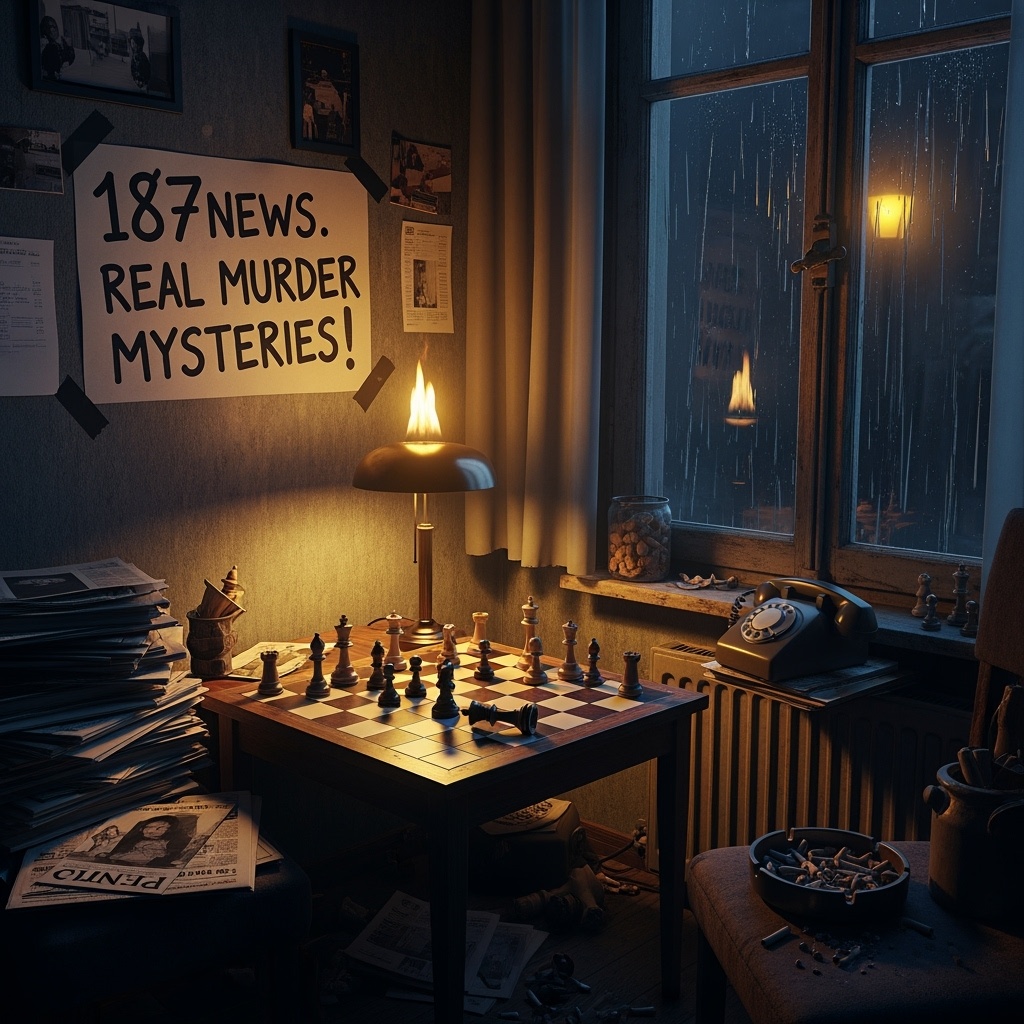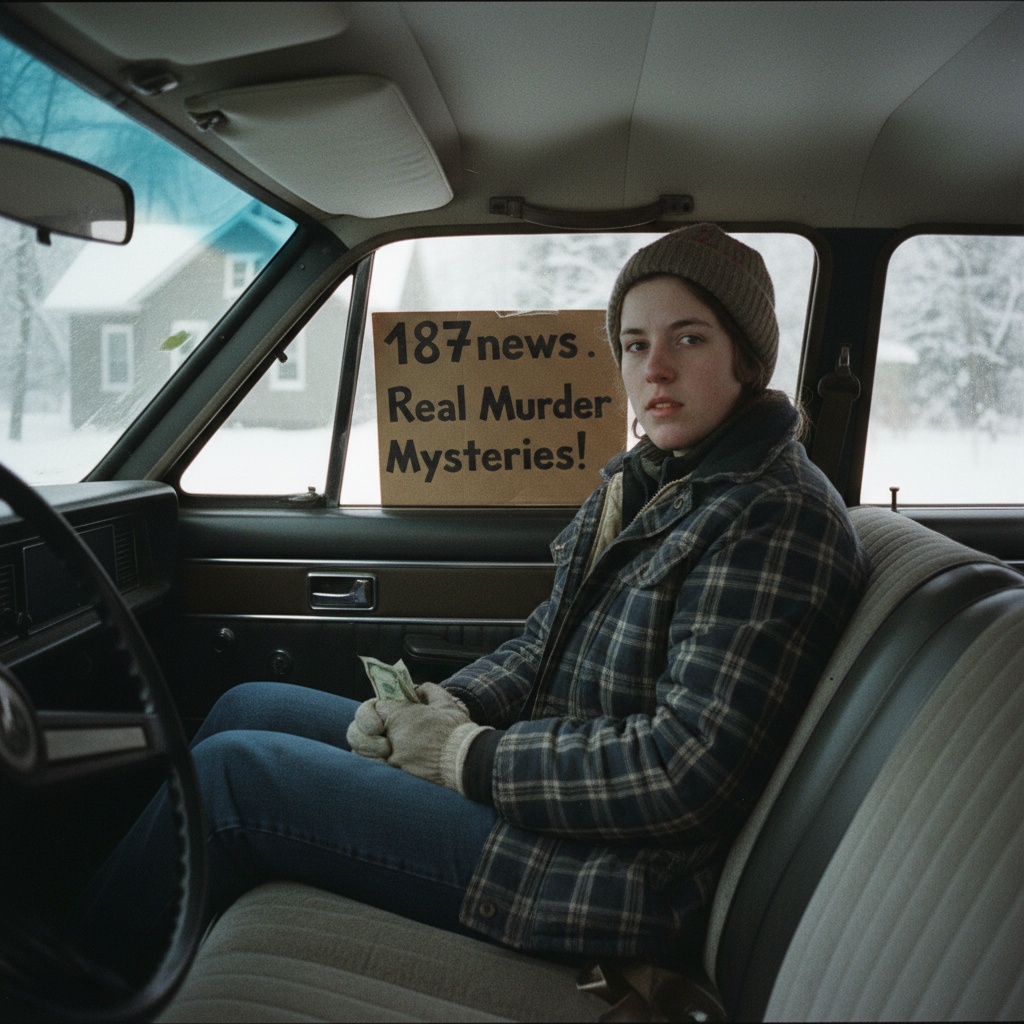The murder of chess genius Gilles Andruet, which shook the French chess scene in the 1990s, is not only the tragic story of a talented chess player, but also a fascinating example of a complex crime involving intrigue, gambling, and a lengthy court case. Gilles Andruet, an international chess master who was also known as the “Mozart of chess,” was the victim of a brutal murder on the night of August 21-22, 1995. The ensuing investigation led to a web of lies and a lack of definitive justice. Gilles Andruet, whose father was the legendary former rally champion Jean-Claude Andruet, rose to fame as a chess player after winning the French Chess Championship in 1988. However, his success on the chessboard led him into the world of gambling, where he focused on blackjack. With his extraordinary memory and clever playing strategy, he initially made remarkable profits. But the more he won, the greater the pressure to continue playing, and soon he was denied access to many casinos because of his success. In a desperate search for money and the thrill of success, he turned to roulette, which led to a dramatic decline in his finances. Not only had Gilles lost a lot of money, but he also had high debts because he had issued uncovered checks, and French banks imposed the so-called “Interdit bancaire” on him. As a result, he was unable to take out further loans or hold a bank account with a French bank. In the first week of August 1995, Gilles came into possession of a clearing check for 398,000 francs through the sale of a family property, but without his own bank account, this check was ultimately worthless to him. To gain access to this money, he turned to Joseph Liany, a man he had met at the casino in Enghien-les-Bains. Liany and his son Franck helped him open a bank account at a Paris branch of a Moroccan bank. Franck was given power of attorney for this account, which ultimately paved the way for Gilles’ fatal fate. On the night of August 21, 1995, Yolanda Z., Gilles’ girlfriend, saw him for the last time. He visited her at the restaurant, which belonged to the “L’Entrecôte” chain, and it seems that he was about to discuss his plans for the upcoming payment of his check. Three other people were also in the car. Although the exact conversations are unknown, everything indicates that the three people in the car planned to kill Gilles in order to get the money. Early in the morning of August 22, a gardener in Saulx-les-Chartreux found Gilles’ body wrapped in a blood-stained bed sheet. All signs indicated that Gilles had been attacked with a baseball bat, with the fatal blow apparently crushing his larynx. Shortly afterwards, the gendarmes discovered a Ford Sierra nearby, which had traces of blood on it and contained Andruet’s identity papers. Just three days after Gilles’ murder, on August 25, 1995, the amount of the check was withdrawn from the Moroccan bank. The nightmare for the family and friends had begun. When the investigation was launched, several people came to the attention of the police. Joseph Liany, a businessman and avid gambler, was quickly identified, and his son Franck was also involved. Sacha Rhoul, Joseph Liany’s nephew and manager of the Golf de l’Étoile restaurant, was also under suspicion, mainly because of his family connection and the fact that he lived in the same environment as the other suspects. Loïc Simon, another member of the Golf de l’Étoile team, later turned out to be a key piece of the puzzle in this crime. His statements provided the prosecution with important information, but Simon committed suicide in 1996 before he could be thoroughly questioned. This left many questions unanswered and confused the investigators. However, according to witnesses, before his suicide, he had admitted to beating Gilles to death with a baseball bat on behalf of Joseph Liany and Sacha Rhoul. After the murder, however, both had refused to pay him the promised share of the money from Gilles’ account. In April 2001, DNA analysis of hair found on the bed sheet in which Gilles was wrapped revealed that the DNA matched that of Sacha Rhoul and Joseph Liany. The first legal proceedings began in November 2003, more than eight years after the murder. Joseph and Franck Liany were charged, while the only witness, Yolanda Z., received threats. In a chaotic trial, the two accused each other of complicity. The prosecutor noted that the situation was almost like a circus. Joseph Liany was eventually sentenced to 15 years in prison, while Franck got off with seven years. But the story took an unexpected turn. In 2006, Joseph Liany was acquitted on the basis of new evidence, as DNA analysis could not be conclusively attributed to Joseph Liany, but also to his nephew Sacha Rhoul. At the same time, Sacha Rhoul was convicted in absentia after evading justice by emigrating to Morocco in 1998. He was sentenced to 15 years. Jean-Claude Andruet, the victim’s father, continued his tireless efforts to obtain justice. His persistence led to an international arrest warrant being issued for Sacha Rhoul, who was finally arrested in 2010 and extradited to France. For years, Sacha Rhoul had managed the luxury hotel “Palais Rhoul” in Marrakesh. In the meantime, Sacha Rhoul’s mother, Sylvia, came forward and accused her brother of being the sole instigator of Gilles’ murder. In January 2014, the third trial against Sacha Rhoul took place. Although the prosecutor was convinced that Rhoul was the key figure, there was again a lack of clear evidence, and the jury acquitted him. This led to frustration and disappointment for the Andruet family, who were never really able to draw a line under the case. The Gilles Andruet murder case remains an unfinished chapter in the history of French criminal law. While some perpetrators have been convicted, the person who actually ordered the murder appears to have gone unpunished. The complexity of the relationships between the suspects and the inability of the justice system to provide clear evidence raise questions about the effectiveness of the legal system. The tragedy of Gilles Andruet will probably always be a cautionary tale of how darkness and intrigue can bring even the brightest stars down from the sky. His legacy as a chess master lives on, but the shadows of his life and violent death will never completely fade away.
The murder of Gilles Andruet, the Mozart of chess

Tagged:AileenWuornosAktuellesAlpenMysteryAngriffAntiterrorAttentateAutoeinbruchBankenVerbrechenCHBaslerBluttatenBayernKrimiBeklemmendSpannendBerichterstattungBernerMysterienBerühmteFälleDeutschlandBerühmteKriminalfälleBetrugBeweisaufnahmeBjarneMädelBlackDahliaBostonStranglerBRDVerbrechenBreakingNewsBrigitteHeikeBrunoLüdkeCelebrityCrimeCharlesMansonColdCaseColdCaseGermanyColdCasesColdCasesÖsterreichCommunityCrimeSolversCrimeDokuSchweizCrimeNeverSleepsCrimeSceneInvestigationCrimeSolveAttemptCyberCrimeDarknetDatenklauDatenschutzverletzungDDRVerbrechenDerMannimEisDetectiveWorkDetektivarbeitDetektivgeschichteDeutscheGeschichteDeutscheKriminalfälleDeutscherMordfallDiebstahlDigitalDetectivesDNAEvidenceDNARevolutionDrogenhandelnDrogenkartellDrogenkonsumDrogenmissbrauchDrogenschmuggelEchteVerbrechenEdGeinEinbruchEmdenMissbrauchsfallErmittlungenErmittlungsarbeitErmordetEvidentialBreakthroughExtremismusFacebookInvestigatorsFahndungFalcoMordtheorieFamiliendramaCHFanTreffenFemaleCriminalsFinanzbetrugFinanzverbrechenForensicScienceForensikForensikÖsterreichForensischeWissenschaftenFritzHaarmannGefährlicheDamenGefährlicheGifteGeheimnisseDerAlpenGeheimnisvolleVergiftungGeldwäscheGenferKriminalfälleGerechtigkeitGerichtsdramaSchweizGerichtsverfahrenGeschichtsverbrechenGesetzlosigkeitGewaltverbrechenGifteInDerKunstGiftigeRezepturenGiftMordGiftmordGeschichteGladbeckerGeiseldramaGlobalColdCasesGruseligeVerbrechenGruselnMitUnsHackingHamburgTrueCrimeHäuslicheGewaltHerculePoirotHinterkaifeckMordeHistoricalCrimeHistorischeVerbrechenHistorischeVerbrechenCHHistoryLover PastMysteriesIdentitätsdiebstahlInternetbetrugJackTheRipperJackUnterwegerJohnWayneGacyJonBenetRamseyJosefFritzlJugendverbrechenJürgenBartschJustizdramaJustizirrtümerJustizsystemKalteFälleDeutschlandKinderhandelKommissarBeckKommissarDupinKommissarMaigretKommissarWallanderKörperverletzungKreditkartenbetrugKrimiAutorenKrimiBuchKrimiDeutschlandKrimiDokumentationKrimiLiteraturKriminalfälleKriminalgeschichtenKriminalgeschichteÖsterreichKriminalitätNRWKriminalitätsgeschichteKriminalnachrichtenKriminalpolizeiKriminalpräventionKriminalpsychologieKriminalstatistikKriminelleAlchemieKriminologieKrimiPodcastsKrimiSchwarzwaldKrimiSerienKultkriminalfälleKunstraubLebachFallLiveBerichterstattungCHLocalColdCasesMagdaGoebbelsMysteryManfredScharfenorthMenschenhandelMilieuStudienMissbrauchMissingAustriaMissMarpleMittelalterlicheVerbrechenModerneGifteModerneSklavereiMordMordfälleMordlustMordundTotschlagMünchenMordMysteriöseFälleMysteriöseTodeMysteriousCaseMysteryInTheUSAMysteryLoverMysteryLoversAustriaNataschaKampuschNaturschutzdeliktNeuesNordicNoirNSUProzessOldCaseNewEvidenceOnlineBetrugOnlineSleuthingOpferhilfeOpferschutzOpferUndTäterOrganisierteKriminalitätÖsterreichMythenPeterKürtenPhilipMarlowePhishingPlünderungPodcastJunkiePolitThrillerSchweizPolizeieinsatzPolizeiruf110ProfilerÖsterreichProfilingPromiSkandalePsychologieDerVerbrechenPsychothrillerRadikalisierungRansomwareRateMitRaubRaubüberfallRauschgiftRechtsmedizinRedditDetectivesRichardRamirezSagenUndMärchenSchuldUndSühneSchweizerKriminalfälleSerienmörderSexhandelSherlockHolmesSicherLebenSpannungPurSpurensucheStarVerbrechenSteirischeVerbrechenStrafrechtSuchtTaschendiebstahlTäterprofileTatortTatortBerlinTatortBremenTatortDeutschlandTatortDortmundTatortGiftfläschchenTatortHistorieTatortKlassikerTatortKölnTatortKommissarTatortKrimiTatortMünchenTatortMünsterTatortsonntagTatortSpekulationenTatortStuttgartTatortuntersuchungTatortWeimarTatortWienTatortZeitTedBundyTerroranschlagTerrorismusTheSodderChildrenThrillerThrillerLesenTimeTravelDetectiveTirolerMysterienTödlicheKulisseTotschlagToxischeWahrheitTrueCrimeAddictTrueCrimeAusstellungenTrueCrimeAutorenTrueCrimeBlogsTrueCrimeBücherTrueCrimeCommunityTrueCrimeDeutschlandTrueCrimeDokuTrueCrimeEventsTrueCrimeFandomTrueCrimeGiftTrueCrimeÖsterreichTrueCrimePodcastTrueCrimePodcastsCHTrueCrimeSchweizTrueCrimeSerieTrueCrimeStoriesTrueCrimeYouTubeUmweltverbrechenUmweltverschmutzungUngeklärteFälleUngeklärteFälleSchweizUnsolvedEuropeUnsolvedMysteryUnterschätztesGiftUrbanLegendsAustriaVandalismusVerboteneLiebeVerbrechenVerbrechenDerMächtigenVerbrechenIm19JahrhundertVerbrechenInBerlinVerbrecheninDeutschlandVerbrechenInWienVerbrechenUndStrafeVerbrechenVonNebenanVerbrecherjagdVergewaltigungVergifteteLiebeVermisstenfälleVersicherungsbetrugVerurteiltDerPodcastVintageCrimeVorsichtGiftWahreVerbrechenWaldbrandstiftungWarumMenschenTötenWildereiWirtschaftskriminalitätZeitVerbrechenZodiacKillerZürcherKrimiZwangsarbeit







